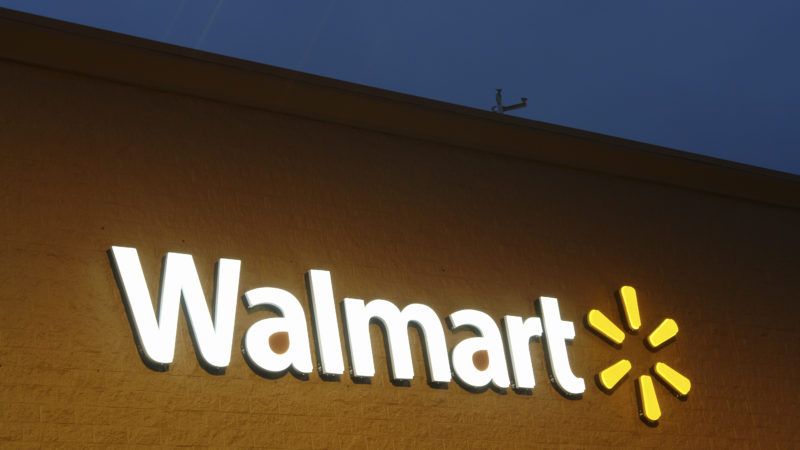Walmart's New Clinics Are a Free Market Experiment in Health Care Reform
No one will ever head to Walmart for a kidney transplant, but retail companies and profit-based clinics certainly can offer high-quality, lower-level services—and impose market discipline in a sector that sorely needs it.

When I needed new glasses, I went to an optometrist for an exam, picked out some dorky black frames, paid my portion and my insurance picked up the rest. Then, by chance, I walked into one of those ubiquitous Walmart optometry centers and realized I could have had the exam and the glasses for little more than the price of the copay. That speaks volumes about our current health system.
When a third party—insurance or government, for instance—pays for something, the prices escalate. What's the first thing an auto body shop asks when you take in your car to repair the fender? "Is this an insurance job?" If it is, the price will be higher than if you're paying for it yourself. I never asked the price of my appendix surgery last year, nor did I care. Blue Cross paid the tab.
It's far worse when government is the default payer, given there are no serious controls on costs. There only are two ways to divvy up resources: pricing or rationing. As economist Thomas Sowell explains, "What everyone wants adds up to more than there is. Market economies deal with this problem by confronting individuals with the costs of producing what they want, and letting those individuals make their own trade-offs."
Healthcare is tough because everyone needs access to life-saving surgeries and drugs. Unfortunately, our policymakers look at the problem through the wrong lens. Many seek to upend an insurance-based system that works remarkably well (despite the high prices) and replace it with government-run systems that will spend the nation into penury and lead to long waits for common services (rationing).
Instead of starting from scratch, policymakers ought to fill in the gaps—meet the needs of those people who are falling through the cracks of the current system. One idea goes back to that example in the first paragraph. No one will ever head to Walmart for a kidney transplant, but retail companies and profit-based clinics certainly can offer high-quality, lower-level services—and impose market discipline in a sector that sorely needs it.
Walmart announced last year that it intends to provide clinics that offer low-cost X-rays, lab work, checkups and dentistry, according to a recent CNBC article. "We're going to have a consumer revolution," former Apple CEO John Sculley told the news network. "Why? Because if the Walmart tests are successful, and I suspect they will be, people will be able to go in and get these kinds of health services at a lower cost than if they had health insurance."
One of the biggest flaws of Obamacare is that it imposed myriad healthcare mandates, requiring health policies to cover every manner of treatment and service that politicians deemed necessary. For instance, it's silly for an insurance company to be forced to provide my wife and me, who are in our late 50s, with birth-control coverage.
In other areas, we choose insurance based on our specific needs. I use insurance to protect against financially catastrophic events, not to cover minor services that I can pay for myself. Other people have different needs and priorities.
Scully explained that the big tech firms "realize that this is the largest remaining industry that has not been revolutionized by modern technologies that has transformed every other big industry in the United States." That's because health care, and health insurance, is dominated by government regulation and subsidy. Private companies can't revolutionize industries that are encrusted with Byzantine rules—and where price signals can't work their magic.
In particular, occupational licensing rules, which are enforced by entrenched industries that want to keep out the competition, make it difficult to innovate. That's true, especially in healthcare industries. One reason the gig economy has been so successful is these emergent companies have created newfangled ways to circumvent competition-stifling policies that lock inefficient systems into place. Thank goodness for clever work-arounds.
If you look at prices over time, you'll find that consumer buying power has improved dramatically in industries that have the fewest government regulations. I remember when my parents bought our first color television in 1973 for $470. I still recall the price because it was such a major purchase, the equivalent of around $2,700 in today's dollars. I recently bought a fancy smart TV for 300 bucks—and chose among dozens of options.
When products or services largely are immune to market pressure (because government provides, subsidizes or heavily regulates them), inflation levels are daunting. California public schools never have enough money even though per-pupil spending has soared. That's true for every public service. College tuition has soared. A day doesn't go by without some politician complaining about skyrocketing healthcare prices. Don't you think there's a connection?
Sculley predicts Walmart-style health clinics can lead to a "consumer revolution." That's no doubt true—provided government gets out of the way and allows it to happen.
This column was first published in the Orange County Register.


Show Comments (94)